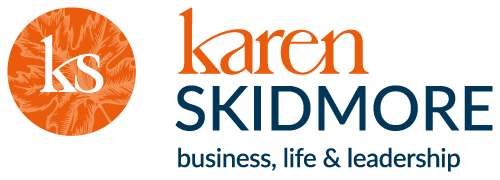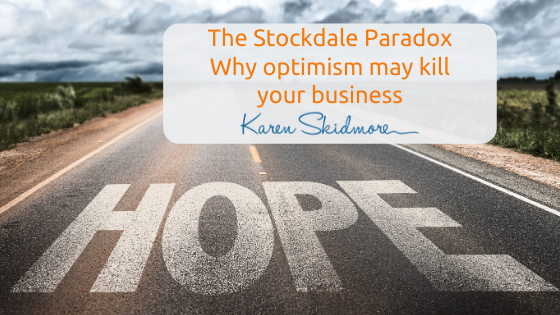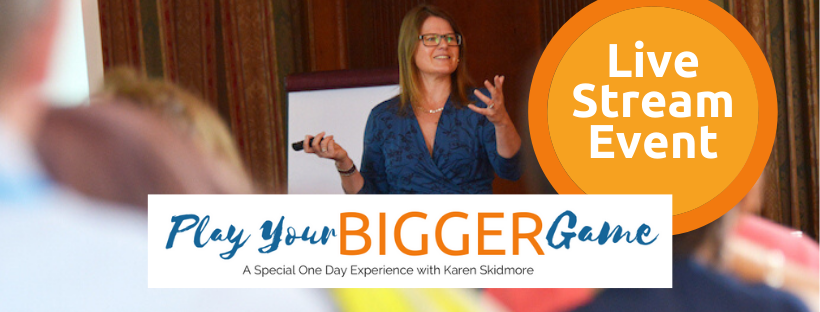I know that none of us could ever have imagined our current status quo. Some of you are now at home with children, others have now found your previously quiet workspaces occupied by spouses. We all have friends and family who we know are vulnerable, so there’s no doubt you are deeply concerned.
We are all facing some of the most challenging weeks and months ahead.
That said, I believe we have to find ways to keep moving forward and find a new normal in which to operate. Which is why I want to share with you today the story of James Stockdale, former vice presidential candidate, naval officer and longest surviving Vietnam prisoner of war.
Last week I was due to interview a good friend of mine for the next series of my True Profit Business podcast. She is inspirational in so many ways, not least because of her deep connection to intuitive thinking in her business strategy. I’ve known her since she started her business from her converted garage 14 years ago and have admired her balance of commitment and grace as she led her team to build one of the biggest brands in family holidays.
Decimated by the past six weeks, the day we were due to speak was following some of the toughest days yet. We both decided that now was not the time to do this interview. We spoke on the phone instead. Her story is not mine to share but suffice to say I was sobbing during the call. And for several hours after.
What I can share with you today is her introduction to me of the Stockdale Paradox.
His story is not an easy one to read. I’ve only skimmed the top; his seven years of torture and endurance contain many horrific incidents. However, it is his strategy of his survival that I have taken inspiration from and feel it’s so relevant to what we all are facing right now.
Author Jim Collins summarises Stockdale’s story in his book, “Good to Great”:
The name refers to Admiral Jim Stockdale, who was the highest-ranking United States military office in the “Hanoi Hilton” prisoner-of-war camp during the height of the Vietnam War. Tortured over twenty times during his eight-year imprisonment from 1965 to 1973, Stockdale lived out the war without any prisoner’s rights, no set release date, and no certainty as to whether he would even survive to see his family again. He shouldered the burden of command, doing everything he could to create conditions that would increase the number of prisoners who would survive unbroken while fighting an internal war against his captors and their attempts to use the prisoners for propaganda.
At one point, he beat himself with a stool and cut himself with a razor, deliberately disfiguring himself, so that he could not be put on videotape as an example of a “well-treated prisoner.” He exchanged secret intelligence information with his wife through their letters, knowing that discovery would mean more torture and perhaps death. He instituted rules that would help people to deal with torture (no one can resist torture indefinitely, so he created a step-wise system–-after x minutes, you can say certain things–-that gave the men milestones to survive toward). He instituted an elaborate internal communications system to reduce the sense of isolation that their captors tried to create, which used a five-by-five matrix of tap codes for alpha characters. (Tap-tap equals the letter a, tap-pause-tap-tap equals the letter b, tap-tap-pause-tap equals the letter f, and so forth, for twenty-five letters, c doubling in fork.) At one point, during an imposed silence, the prisoners mopped and swept the central yard using the code, swish-swashing out “We love you” to Stockdale, on the third anniversary of his being shot down. After his release, Stockdale became the first three-star officer in the history of the navy to wear both aviator wings and the Congressional Medal of Honor.
How on earth did he deal with it when he was actually there and did not know the end of the story?”
“I never lost faith in the end of the story,” he said when I asked him. “I never doubted not only that I would get out, but also that I would prevail in the end and turn the experience into the defining event of my life, which in retrospect, I would not trade.”
Finally, I asked, “Who didn’t make it out?”
“Oh, that’s easy,” he said. “The optimists.”
“The optimists? I don’t understand,” I said, now completely confused given what he’d said earlier.
“The optimists. Oh, they were the ones who said, ‘We’re going to be out by Christmas.’ And Christmas would come, and Christmas would go. Then they’d say, ‘We’re going to be out by Easter.’ And Easter would come, and Easter would go. And then Thanksgiving, and then it would be Christmas again. And they died of a broken heart. This is a very important lesson. You must never confuse faith that you will prevail in the end–-which you can never afford to lose–-with the discipline to confront the most brutal facts of your current reality, whatever they might be.”
What I’ve taken from this story is the danger of blind hope and optimism.
We don’t know when all this ‘will end’. It’s not ‘business as usual’ and we will never go ‘back to normal’; what we are experiencing right now and in the coming weeks and months will be felt for years from now.
But this is not the time to be falling into fear and pessimism. Several of my Momentum members have been reporting over the weekend of requests for work still coming in. Hurrah! But there’s no doubt many of you are, and will be, experiencing a drop in revenue over the coming weeks and months because of projects postponed and client work cancelled.
Fear is percolating from all angles but this is not a time for panic. We only have to look at the impact panic buying has had our food supply chain to know that a scarcity mindset is NOT helpful.
If you are like almost all my clients that I work with, you are running a low-cost business that sells your expertise, talents or skills in some form or other. You may have a small team, but you probably aren’t one of the many thousands of businesses who will have to take advantage of the Government’s funding and assistance in the coming months.
You are self-employed, freelancing or running a service-based business from home or virtual offices, and even if you take advantage of the promised tax holidays, you will still have to pay your tax at some point; they are simply giving us grace periods to help manage our immediate situation.
However, this doesn’t mean we fall into the trap of pessimism and scarcity thinking. Money needs to flow so cancelling everything, hunkering down and restricting yourself to a diet of lentils is not helpful for a business like yours.
But go too high on the optimism scale and optimism will kill your business. If you live in the hope that everything will be OK in a few weeks, it will leave you with your head in the sand and unprepared for going the distance.
No matter what is going on for you right now, I believe that this is a time for holding your vision, with a healthy dose of pragmatism on the side.
So get a grip of your finances. Get really clear on what your monthly outgoings are, know when your next annual subs are due, such as business insurance, (because surprises hurt your cash flow!), and look at your household budget; this is the time to clean up your expenditures and to change up, rather than slash, your marketing spend.
Take time to pause and re-think your approach to how you can serve your clients and customers. Tearing up your business plans and knee-jerk into taking action on ideas could end up distracting you or end up with an unsustainable ‘cheap’ offer that exhausts you.
Prepare for the worst so you have the resilience to not only carry on but also be financially able to keep holding your vision and see where you can pivot and evolve your business offers.
As James Stockdale never lost faith that he would eventually leave captivity, so must we have faith that we can and will get through this.
Your business will evolve.
You will learn many new skills over the coming months.
You will have days of feeling helpless and lost.
You will have days of inspired action and an immense sense of gratitude and appreciation.
You won’t be alone. You will need to ask for help and support.
You will find yourself needing to be creative, daring and bold with your decisions.
You will need to dig deep into your vision and the difference you so want to make through your business.
And you will need to be agile and light on your toes to keep yourself available to the opportunities that do present themselves to you.
This is not a time for optimism and blind hope.
This is a time for vision and leadership.
Until next time, do less, be more and play bigger.

Thursday 2nd April 9.30am to 5pm UK Time
If you are looking for help moving forward and know you have to evolve your business, then take a look at our event on Thursday, 2nd April. We are live streaming our previously advertised in-person workshop and have re-designed the content to give you the four important steps we all have to take over the coming months: Pause, Pivot, Plan and a fourth session on People. It’s critical that we ALL reach out and ask for help, in business AND life, particularly now as we all seem to working with many more small and big people in our homes right now!
www.KarenSkidmore.com/biggergame








